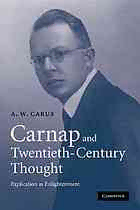
Carnap and twentieth-century thought. Explication as enlightenment PDF
Preview Carnap and twentieth-century thought. Explication as enlightenment
CARNAP AND TWENTIETH-CENTURY THOUGHT Rudolf Carnap (1891–1970) is widely regarded as one of the most important philosophers of the twentieth century. Born in Germany andlateraUScitizen,hewasafounderofthephilosophicalmove- mentknownasLogicalEmpiricism.Hewasstronglyinfluencedbya numberofdifferentphilosophicaltraditions(includingthelegaciesof bothKantandHusserl),andalsobytheGermanYouthMovement, theFirstWorldWar(inwhichhewaswoundedanddecorated)and radicalsocialism.Thisbookplaceshiscentralideasinabroadcultural, political and intellectual context showing how he synthesised many different currents of thought to achieve a philosophical perspective that remains strikingly relevant today. Its rich account of a philoso- pher’sresponsetohistimeswillappealtoallwhoareinterestedinthe developmentofphilosophyinthetwentiethcentury. a. w. carus is an Affiliated Lecturer in the Department of Eco- nomics,UniversityofCambridge. CARNAP AND TWENTIETH-CENTURY THOUGHT Explication as Enlightenment A. W. CARUS CAMBRIDGE UNIVERSITY PRESS Cambridge, New York, Melbourne, Madrid, Cape Town, Singapore, São Paulo Cambridge University Press The Edinburgh Building, Cambridge CB2 8RU, UK Published in the United States of America by Cambridge University Press, New York www.cambridge.org Information on this title: www.cambridge.org/9780521862271 ©A. W. Carus 2007 This publication is in copyright. Subject to statutory exception and to the provision of relevant collective licensing agreements, no reproduction of any part may take place without the written permission of Cambridge University Press. First published in print format 2007 ISBN-13 978-0-511-45510-0 eBook (EBL) ISBN-13 978-0-521-86227-1 hardback Cambridge University Press has no responsibility for the persistence or accuracy of urls for external or third-party internet websites referred to in this publication, and does not guarantee that any content on such websites is, or will remain, accurate or appropriate. For HowardStein Letusbepreparedtosetasidethehabitsofourowndayandtohonourthepast asatreasureofneglectedandforgotten,butstillliving,possibilities.Thereisno otherwaytoescapetheindignityofthedespotisminflictedbyourprovinciality intime,nootherwaytoregainthefreedomonlyhistorycanafford.Wehadlet ourselvesbeconvincedthathistoryisuseless.Muchtoolateitbegantodawnon ushownarrowlythisconfinesourhorizons,howourgrowthisstuntedwhenwe seeknothinginhistorybutcontradictionorreinforcement,insteadoffrolicking carelesslyandselflesslyinitsmeadows,ledonlybycuriosity. EmilStaiger(1949) Contents Preface pageix Noteonthestyleofcitation xiv Introduction 1 1 Theculturalinheritance 41 2 Theintellectualinheritance:positivismandKantianism 65 3 Thegrandplanofa‘systemofknowledge’:scienceandlogic 91 4 Carnap’searlyneo-Kantianism 109 5 TheimpactofRussell 139 6 Rationalreconstruction 161 7 TheimpactofWittgenstein 185 8 Thecrisisofrationalreconstruction,1929–1930 208 9 Liberation 229 10 Tolerance 252 11 Theidealofexplication 273 Bibliography 310 Index 340 vii Preface Mathematicians,unliketherestofus,haveretainedsomethingoftheorig- inalEnlightenmentspirit,thoughtthenovelistRobertMusil;theyprovide examplesofaspiritualdaringthathasotherwisefallenbythewayside.‘We others’, Musil regretted, ‘have let our courage drop since the time of the Enlightenment. Some small bungle was enough to get us off the track of reason,andwenowleteverysoft-headedvisionarydenouncetheprojects of a d’Alembert or a Diderot as misguided rationalism.’ We are apt to pleadthecauseoffeelingagainsttheintellect,forgettingthatweinhabitan intellect-constructedworld(Musil1913a).By‘we’hemeantCentralEuro- peans of the early twentieth century, but his warnings are no less relevant toourowntimes.‘Wemustbeonourguard,aboveall’,hewrote,‘against allyearningsforthede-complicationofliteratureandlife,forHomericor religiouswarmth,foruniformityandwholeness’(Musil1913b). The western philosophical tradition began with the idea that insight or knowledge about the nature of things could somehow be applied by humanbeingstotheshapingoftheirlives.ForPlato,theparadigmofsuch knowledge or insight was geometrical proof. The applicability of knowl- edge,particularlydererumnaturae,tolifewasequallyimportantformany othersinantiquity,includingnon-PlatonistssuchasLucretius.Thisphilo- sophicalidealreawokeinlatemedievalEurope,andwaspartlyresponsible forthecreationofmodernscienceintheseventeenthcentury.ButNewton’s achievementtransformedourknowledgeaboutthenatureofthings,aswell as our conception of knowledge. This transformation has been described inmanyways,andthereismuchcontroversyaboutwhichofthesewaysis best.Butfromatlatest1687orso,knowledgebecameirrevocablytheoret- ical. A gap opened up between knowledge and the shaping of individual human lives, a gap that has grown steadily wider over the centuries since then. The old philosophical ideal of applying knowledge to the shaping of practical life seemed doomed to irrelevance. Its vigorous revival by the EnlightenmentledonlytotheRomanticreaction,whosemostpersuasive ix
